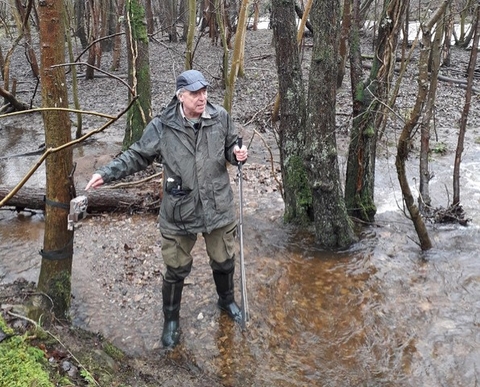
Guy Broome
'I’ve spent my time volunteering for many organisations, including Cumbria Wildlife Trust, Natural England, the RSPB, University of Cumbria, Cumbria Biodiversity Data Centre and North Pennines AONB.'
Guy Broome
Guy is a dedicated volunteer with a particular fascination for butterflies and moths. Here’s the nomination we received for him:
‘Guy is moth recorder and volunteer with Cumbria Wildlife Trust and Cumbria Biodiversity Data Centre. His records and photographs are really valuable but I’m nominating him because of how freely he shares his time, knowledge, and enthusiasm. He inspires children and adults alike, and helps at events for families, runs training courses for wannabe moth recorders, and mentors and supports students from the University of Cumbria. He does a lot for wildlife recording in Cumbria but more importantly he supports and encourages new people and makes it easier to get involved in wildlife recording, especially as a complete beginner.'
Here’s more from Guy in his own words:
'I was a surgeon in the NHS until 2015, when I chose to take early retirement. Wanting to do something different, I turned to my love of moths and butterflies, and began to volunteer.
My fascination with Lepidoptera started when I was very young, and at university I chose to sit in on entomology lectures alongside my own, so I’ve been cultivating my knowledge for a long time alongside my work.
After leaving medicine, I did consider switching careers, but I decided volunteering was best because I didn’t want to take a role away from someone else who was up and coming.
Since then, I’ve spent my time volunteering for many organisations, including Cumbria Wildlife Trust, Natural England, the RSPB, University of Cumbria, Cumbria Biodiversity Data Centre and North Pennines AONB (I’m the current holder of the North Pennines AONB Pendlebury Award for contribution to wildlife, environment and local culture).
This has included teaching the public for citizen science, as well as working with schools, teachers, undergrads and post grads learning wildlife surveying skills, like moth trapping and camera trapping.
I’ve also tapped into my previous skills from the world of medicine, using evidence-based methodology to set up research and analyse published science to aid strategy for wildlife.
When it comes to inspiring other people to care for wildlife, I think encouraging them to take small but effective steps is best. Taking action for nature can feel overwhelming, but you can always start somewhere. Even if you only have a small outdoor space at home, you can learn to plant it to help wildlife thrive.'
See our current volunteering opportunities
